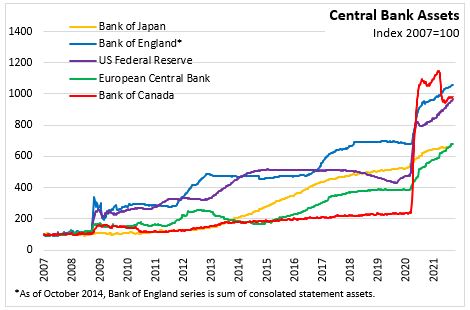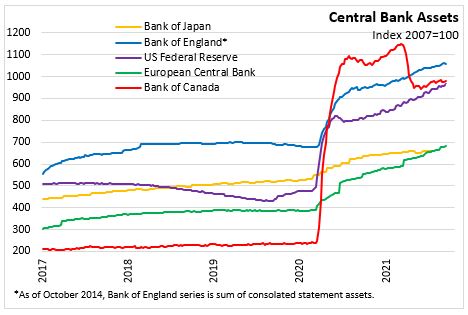The Economics and Statistics Division maintains archives of previous publications for accountability purposes, but makes no updates to keep these documents current with the latest data revisions from Statistics Canada. As a result, information in older documents may not be accurate. Please exercise caution when referring to older documents. For the latest information and historical data, please contact the individual listed to the right.
<--- Return to Archive
For additional information relating to this article, please contact:
September 22, 2021BANK OF JAPAN MONETARY POLICY The Policy Board of the Bank of Japan decided to maintain a negative interest rate of 0.1% to the Policy-Rate Balances in current accounts held by financial institutions at the Bank. The Bank of Japan will also purchase a necessary amount of Japanese government bonds (JGBs) without setting an upper limit in order to keep the 10-year JGB yields at around zero per cent.
In addition, the Bank will purchase exchange-traded funds (ETFs) and Japan real estate investment trusts (J-REITs) so that their amounts outstanding will increase at annual paces with upper limits of about 12 trillion yen and about 180 billion yen, respectively. The Bank will continue purchases of Commercial paper and corporate bonds with an upper limit on the amount outstanding of about 20 trillion yen in total until the end of March 2022.
The Bank will continue with "Quantitative and Qualitative Monetary Easing (QQE) with Yield Curve Control," aiming to achieve the price stability target of 2 per cent, as long as it is necessary for maintaining that target in a stable manner. The Bank also noted that it will continue expanding the monetary base until the year-on-year rate of increase in the observed CPI (all items less fresh food) exceeds 2 per cent and stays above the target in a stable manner.
At today’s Monetary Policy Meeting, the Bank decided on details of the Fund-Supplying Operations to Support Financing for Climate Change Response which is aimed at supporting private financial institutions' various efforts in fields related to climate change.
The economy has picked up but remains in a severe situation due to the COVID-19 pandemic. Exports and industrial production have increased with recovery among trading partners but some production has been affected by supply-side constraints. Business fixed investment has picked up with improvement in corporate profits and business sentiment. The employment and income situation remains weak due to COVID-19. Private consumption has not recovered with lower activity for eating and drinking services and accommodations. Housing investment has increased in the Japan. Going forward, further recovery is expected but face-to-face services sector is expected to be lower in the near term. Progress with vaccinations, rising external demand, accommodative financial conditions, and government’s economic measure are expected to be supportive.
The year-on-year rate in the consumer price index (CPI, all items less fresh food) has been around 0% with higher energy prices offsetting COVID-19 shock and lower mobile phone charges. The CPI expected to rise slightly into positive territory with rising energy prices in the near term, before rising gradually as economic activity improves.






Source: Bank of Japan, Statement on Monetary Policy (Sept 21/22, 2021)
<--- Return to Archive